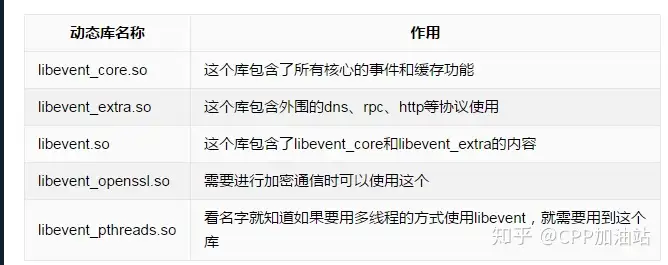1.生成动态库说明
在开始使用之前,我们需要先搞清楚libevent编译生成的各个动态库的作用。 在下载libevent源码包进行编译以后,当前目录生成.libs目录,该目录下是所有的目标文件,这里我们只说明个动态库so文件的作用,通过makefile我们可以知道各个动态库包含内容:

下面使用libevent实现了一个很简单的服务端和客户端程序。
2. 服务端代码实现
//server-event.cpp
#include <string.h>
#include <errno.h>
#include <stdio.h>
#include <signal.h>
#include <netinet/in.h>
#include <arpa/inet.h>
#include <sys/socket.h>
#include <event2/bufferevent.h>
#include <event2/buffer.h>
#include <event2/listener.h>
#include <event2/util.h>
#include <event2/event.h>
static const int PORT = 9995;
static char g_szWriteMsg[256] = {0};
static char g_szReadMsg[256] = {0};
static int g_iCnt = 0;
static void listener_cb(struct evconnlistener *, evutil_socket_t,
struct sockaddr *, int socklen, void *);
static void conn_writecb(struct bufferevent *, void *);
static void conn_readcb(struct bufferevent *, void *);
static void conn_eventcb(struct bufferevent *, short, void *);
int
main(int argc, char **argv)
{
struct event_base *base;
struct evconnlistener *listener;
struct event *signal_event;
struct sockaddr_in sin;
base = event_base_new();
if (!base) {
fprintf(stderr, "Could not initialize libevent!\n");
return 1;
}
memset(&sin, 0, sizeof(sin));
sin.sin_family = AF_INET;
sin.sin_port = htons(PORT);//固定一个端口号
//创建、绑定、监听socket
listener = evconnlistener_new_bind(base, listener_cb, (void *)base,
LEV_OPT_REUSEABLE|LEV_OPT_CLOSE_ON_FREE, -1,
(struct sockaddr*)&sin,
sizeof(sin));
if (!listener) {
fprintf(stderr, "Could not create a listener!\n");
return 1;
}
event_base_dispatch(base);
evconnlistener_free(listener);
//event_free(signal_event);
event_base_free(base);
printf("done\n");
return 0;
}
//有连接来时调用
static void
listener_cb(struct evconnlistener *listener, evutil_socket_t fd,
struct sockaddr *sa, int socklen, void *user_data)
{
struct event_base *base = (struct event_base*)user_data;
struct bufferevent *bev;
//构造一个bufferevent
bev = bufferevent_socket_new(base, fd, BEV_OPT_CLOSE_ON_FREE);
if (!bev) {
fprintf(stderr, "Error constructing bufferevent!");
event_base_loopbreak(base);
return;
}
//绑定读事件回调函数、写事件回调函数、错误事件回调函数
bufferevent_setcb(bev, conn_readcb, conn_writecb, conn_eventcb, NULL);
bufferevent_enable(bev, EV_WRITE);
bufferevent_enable(bev, EV_READ);
const char *szMsg = "hi client!";
bufferevent_write(bev, szMsg, strlen(szMsg));
}
static void
conn_writecb(struct bufferevent *bev, void *user_data)
{
//printf("touch conn_writecb\n");
// if ( strlen(g_szWriteMsg) > 0 )
// {
// bufferevent_write(bev, g_szWriteMsg, strlen(g_szWriteMsg));
// memset(g_szWriteMsg, 0x00, sizeof(g_szWriteMsg));
// }
}
static void
conn_readcb(struct bufferevent *bev, void *user_data)
{
//printf("touch conn_readcb\n");
memset(g_szReadMsg, 0x00, sizeof(g_szReadMsg));
struct evbuffer *input = bufferevent_get_input(bev);
size_t sz = evbuffer_get_length(input);
if (sz > 0)
{
bufferevent_read(bev, g_szReadMsg, sz);
printf("cli:>>%s\n", g_szReadMsg);
memset(g_szWriteMsg, 0x00, sizeof(g_szWriteMsg));
snprintf(g_szWriteMsg, sizeof(g_szWriteMsg)-1, "hi client, this count is %d", g_iCnt);
g_iCnt++;
//printf("ser:>>");
//gets(g_szWriteMsg);
//scanf("%s", g_szWriteMsg);
bufferevent_write(bev, g_szWriteMsg, strlen(g_szWriteMsg));
}
}
static void
conn_eventcb(struct bufferevent *bev, short events, void *user_data)
{
if (events & BEV_EVENT_EOF) {
printf("Connection closed.\n");
} else if (events & BEV_EVENT_ERROR) {
printf("Got an error on the connection: %s\n",
strerror(errno));/*XXX win32*/
}
/* None of the other events can happen here, since we haven't enabled
* timeouts */
bufferevent_free(bev);
}3. 客户端代码实现
//client-event.cpp
#include <string.h>
#include <errno.h>
#include <stdio.h>
#include <signal.h>
#include <netinet/in.h>
#include <arpa/inet.h>
#include <sys/socket.h>
#include <event2/bufferevent.h>
#include <event2/buffer.h>
#include <event2/listener.h>
#include <event2/util.h>
#include <event2/event.h>
static const int PORT = 9995;
static char g_szWriteMsg[256] = {0};
static char g_szReadMsg[256] = {0};
static int g_iCnt = 0;
static void conn_writecb(struct bufferevent *, void *);
static void conn_readcb(struct bufferevent *, void *);
static void conn_eventcb(struct bufferevent *, short, void *);
int
main(int argc, char **argv)
{
struct event_base *base;
struct sockaddr_in sin;
base = event_base_new();
if (!base) {
fprintf(stderr, "Could not initialize libevent!\n");
return 1;
}
memset(&sin, 0, sizeof(sin));
sin.sin_addr.s_addr = inet_addr("192.168.233.250");
sin.sin_family = AF_INET;
sin.sin_port = htons(PORT);
struct bufferevent* bev = bufferevent_socket_new(base, -1, BEV_OPT_CLOSE_ON_FREE);
if (bev == NULL )
{
fprintf(stderr, "socket init failed\n");
return 1;
}
bufferevent_setcb(bev, conn_readcb, conn_writecb, conn_eventcb, NULL);
//连接服务端
int flag = bufferevent_socket_connect(bev, (struct sockaddr*)&sin, sizeof(sin));
if (-1 == flag )
{
fprintf(stderr, "connect failed\n");
return 1;
}
bufferevent_enable(bev, EV_READ | EV_WRITE);
event_base_dispatch(base);
event_base_free(base);
printf("done\n");
return 0;
}
static void
conn_writecb(struct bufferevent *bev, void *user_data)
{
//printf("touch conn_writecb\n");
// if ( strlen(g_szWriteMsg) > 0 )
// {
// bufferevent_write(bev, g_szWriteMsg, strlen(g_szWriteMsg));
// memset(g_szWriteMsg, 0x00, sizeof(g_szWriteMsg));
// }
}
static void
conn_readcb(struct bufferevent *bev, void *user_data)
{
//printf("touch conn_readcb\n");
memset(g_szReadMsg, 0x00, sizeof(g_szReadMsg));
struct evbuffer *input = bufferevent_get_input(bev);
size_t sz = evbuffer_get_length(input);
if (sz > 0)
{
bufferevent_read(bev, g_szReadMsg, sz);
printf("ser:>>%s\n", g_szReadMsg);
memset(g_szWriteMsg, 0, sizeof(g_szWriteMsg));
snprintf(g_szWriteMsg, sizeof(g_szWriteMsg)-1, "hi server,this count is %d", g_iCnt);
g_iCnt++;
//printf("cli:>>");
//gets(g_szWriteMsg);
//scanf("%s", g_szWriteMsg);
bufferevent_write(bev, g_szWriteMsg, strlen(g_szWriteMsg));
}
}
static void
conn_eventcb(struct bufferevent *bev, short events, void *user_data)
{
if (events & BEV_EVENT_EOF) {
printf("Connection closed.\n");
} else if (events & BEV_EVENT_ERROR) {
printf("Got an error on the connection: %s\n",
strerror(errno));/*XXX win32*/
}
else if(events & BEV_EVENT_CONNECTED)
{
//连接成功时走这里,并且要客户端第一次触发读事件后连接才真正建立起来
printf("connect success\n");
const char* msg = "hi server,hao are you";
bufferevent_write(bev, msg, strlen(msg));
return;
}
bufferevent_free(bev);
}上面服务端和客户端代码使用libevent建立了一个简单的聊天应用,编译时需链接-levent_core。